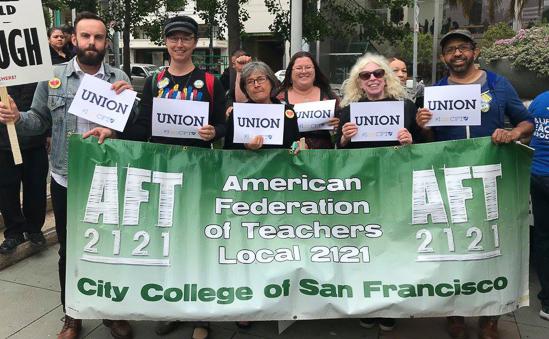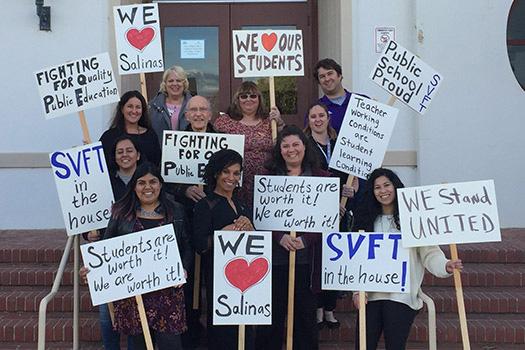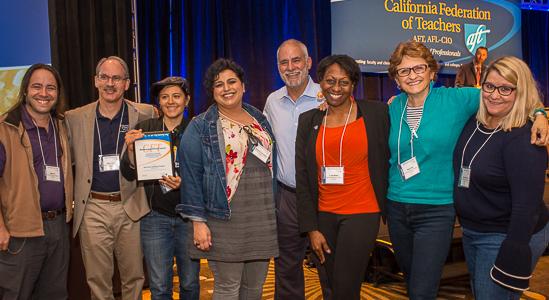Supreme Court’s Janus decision barely ripples through classified locals
No one was surprised when the Janus decision from the U.S. Supreme Court came down over the summer. In the months since then, however, locals across California have defied predictions of a mass exodus of dues-paying members. In fact, after two years of recruiting new employees and convincing agency fee payers to join, union ranks are growing.
Part-timers are still sticking with their union
On June 27, the storm clouds were gathering. The Janus v. ASFCME decision had just come down from the U.S. Supreme Court in a 5-4 ruling, overturning 40 years of legal precedent and marking the abrupt end of union fair share, or agency fee, for public employees.
Now non-union members who benefit from the hard work of unions who still represent them at the bargaining table would no longer be required to pay their fair share.
CFT members step up to the plate following Janus v. AFSCME decision
On June 27, the U.S. Supreme Court overturned decades of precedent and eliminated the right of public sector unions to collect fair share, or agency fees, from non-members.
The justices ruled 5-4 in favor of Mark Janus, an Illinois fee payer, in Janus v. AFSCME Council 31, overturning the 1977 precedent established in Abood v. Detroit Board of Education. Those backing the case clearly hoped the decision would cripple union operations, but with so much at stake for educators and public education, CFT members have not only chosen to stay united but have gained in strength as a result.
The Janus decision is an attack on our voice and on public education
This morning in a 5-4 ruling the U.S. Supreme Court decided in favor of Mark Janus in the Janus v. AFSCME Council 31 case. The ruling overturns decades of precedent and eliminates the ability of public sector unions to collect fair share, or agency fees.
Workplace organizing: Facing new threat, members recommit to their unions
For years, the conservative majority on the U.S. Supreme Court threatened to clip unions’ wings if the right case came before the bench.
Classified AFT locals across California have been preparing for the decision in Janus v. AFSCME by asking agency fee payers to become full members, and recruiting at new employee orientations. The membership drives have meant an influx of new enthusiasm and a renewed sense of union pride.
Membership drives in the community colleges mean more adjunct power
The forthcoming Supreme Court ruling in Janus vs. AFSCME poses a serious threat to union strength. Any union is only as strong as its membership base, and when unions have higher percentages of the workers in its unit as active members, they are stronger at the bargaining table, and better able to protect its workers from violations of their rights.
Delivering for the union: Signing up new members one stop at a time
Driver and local president Albert Lopez moves between 13 campuses
The Riverside County community of Menifee is on the upswing. More than 1,000 new homes are under construction, new businesses are opening their doors, and new families are moving in. The Menifee Union School District sees increased enrollment on the horizon. The Menifee Council of Classified Employees is also expanding. In fact, the CFT recently honored the local for placing second in two categories recognizing member growth: most new members (151) and highest rate of growth (42 percent).
Supreme Court set to rule against union ‘fair share’
Conservatives launch another attack on workers, unions, democracy
Quick download: FAQ about Janus v. AFSME (pdf, 2pp)
What will the court decide?
The lawsuit Janus v. AFSCME asks the U.S. Supreme Court to decide whether public sector unions may continue to charge non-members in a workplace represented by the union a fee (“agency fee” or “fair share”) equal to the cost of representing them. The court’s ruling is expected early next year.
Tried and true methods: Union organizing begins in the workplace
By Joshua Pechthalt, CFT President
We learned in the final days of September that the U.S. Supreme Court will take up another union fair share case. With the court’s ruling coming early next year, it feels like we are on a ship with an iceberg rapidly approaching. Fortunately, as we prepare for an unfavorable decision in the Janus v. AFSCME case, we had already prepared for the similar Friedrichs v. California Teachers Association case.







